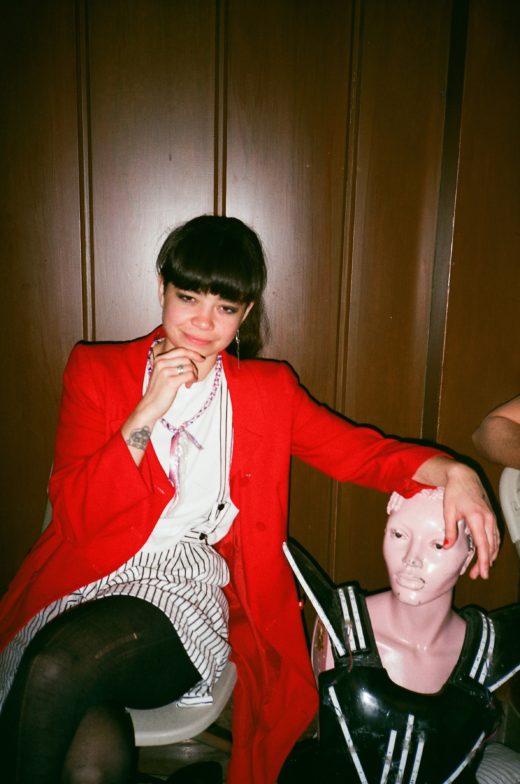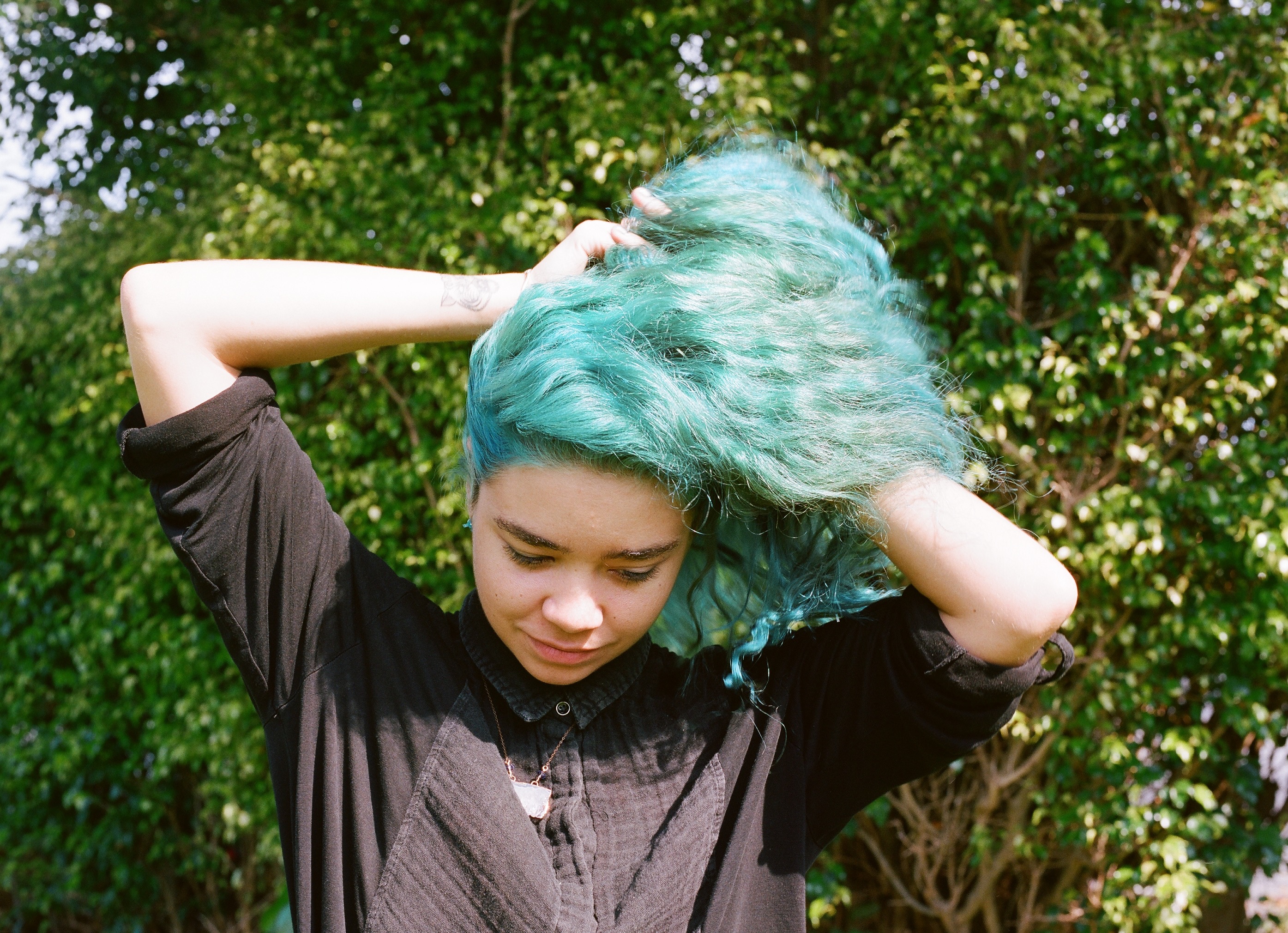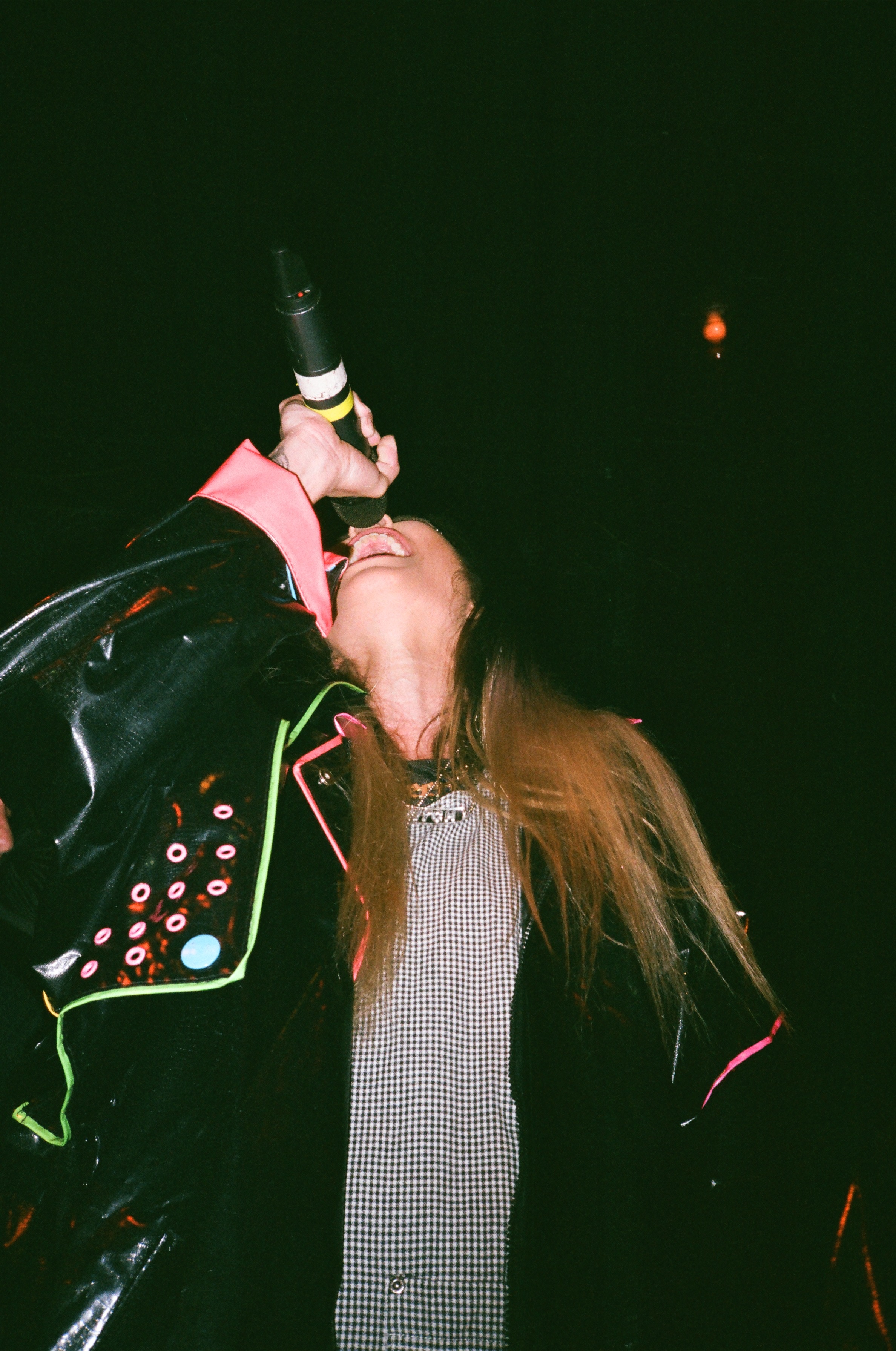- The State of Arts Funding: Deana Haggag and Dennis Scholl in Conversation

- THE MFU AT ARTCENTER/SOUTH FLORIDA
EVERY WOMAN NEEDS A ROOM OF HER OWN: IN CONVERSATION WITH POORGRRRL’S TARA LONG
Monica Uszerowicz

Poorgrrrl has two origin stories. One begins in Little Haiti, at the former Royal Assembly Kingdom of Elohim Church, temporarily dubbed the “Little Haiti Country Club.” She and her now-producer, Byrdipop— a.k.a. Andrew Byrd or Byrd—pumped bass out of a massive subwoofer, utilizing a mixer to make eerie frequencies that thumped like heartbeats. It was 2014. Her hair was blue and so was her dress and the bass ripped through the space like a wave. Years later, she’d sing “I surrender to you/ocean so blue” in a warehouse next to similar speakers and similar booming sounds. Poorgrrrl is a singer and rapper. She’s also Tara Long, an artist and curator born and bred in Miami. The city is a character that appears in her songs, in her cadence and references. Maybe you saw her cameo in the video for T-Pain (ft. Young M.A.)’s “F.B.G.M.,” a jacket emblazoned with her moniker. Alternatively, perhaps you saw the Reddit thread at once mocking and elucidating her video for “TRIPTIC”—from her first EP, PITIPARTI— a parody of Miami as a city of superficialities, at once ostentatious and glib.
The other story starts when Long was very young. Precocious and sensitive, she lost her mother at age nine and was raised by her aunts— “poor girl,” people would say. She bounced between relatives, gleaning stories about her parents from each of them; to this day, she considers her memory a fragmented thing, and her identity a collection of multiple histories. But Long was always an artist, drawing and doodling, rapping and break-dancing, “sneaking” into South Miami Elementary’s magnet art program in fourth grade. She later attended Parson’s School of Design, where she formed the band and project Jit Real with Imma Asher and Yamil Rodriguez. While in New York, she thought often about rap and bass, their presence in her adolescence, their power in making listeners feel good. That led to the subwoofer performance back in Miami, city of bass. It was the first of many performances under the same name as her Instagram handle: @Poorgrrrl. But Poorgrrrl is, arguably, Long’s alter-ego. She might not want your pity, but she does want you to listen. Ahead of her forthcoming full-length on Parachute Records, I spoke to her, sitting between the kitchen and Byrd’s gear, at her apartment.
Monica Uszerowicz: You’ve told me that you remember your history in fragments, and that Poorgrrrl is a project born from these memories.
Poorgrrrl: After receiving a complex post-traumatic stress disorder (PTSD) diagnosis, I came to understand myself more. With complex PTSD, multiple traumas happen over a period of time, which can cause a kind of identity crisis, because all these changes happened during your childhood, when you’re supposed to be building certain processing mechanisms. I think we all have identity crises, but I’ve always had a hard time with it. Most people would think I have a really strong identity. To me, it’s more of a strong personality, whereas identity I relate more to a job that someone does. One day, I’ll be content: “I’m an artist, multi-platform, blahblahblah.” The next day, I think, “No, I’m a writer, a lyricist.” The next day, I’m like, “I’m a loser. I don’t do anything.” That, I think, comes from this lack of a foundation regarding who I am, where I came from, who my family is, what their history is. It’s all a big mystery. Things shifted a lot in my childhood and, when I’m thinking, I mostly think of my memories. They’re fragmented feelings or moments. That’s where Poorgrrrl comes from. I didn’t even realize it.
MU: But like so many other things, identity exists on a spectrum. Do you think, maybe, you’re multitudinous?
PG: That’s what I want to believe. There is something in me that negates and doubts what I am, what I’m capable of. But I want to be more confident in the way that I work, to feel sure of how I’m doing. That’s the other thing about the project: it was a goal of mine to create something out of that mess, and then have it actually succeed and overcome whatever that is.
MU: What are the origins of Poorgrrrl as a musical project?

PG: I started the Instagram when I was in college in New York City. I was late on it—I was born right before the Millenials, so I wasn’t really into social media. I’m timid about using all of it. My friend Tao Rey, who’s also an artist, told me, “It’s just pictures; it’s a cool way to look at your own composition.” He would use it beautifully, and I thought, “This platform could possibly be cool.” When I came back to Miami, I had a sound piece at the Little Haiti Country Club (LHCC) with Byrd. I don’t remember the exact moment, but that name—Poorgrrrl—came to me. When I changed my Instagram name to that, it didn’t have anything to do with my music. I just felt the name explained myself to me very perfectly. I completely relate to Poorgrrrl. My whole life, growing up, was all about pity, people pitying me. That’s why I would lie and not tell them about me.
MU: How’d you start recording as Poorgrrrl?
PG: The piece at the LHCC featured a giant subwoofer. I had this idea to isolate it, and create some sort of programming that’d allow me to use to subwoofer to make certain frequencies. That’s when Byrd came into the picture. He helped program a mixer to do that. That was big for me, coming out of college: isolating bass. Bass felt like home. I wondered, what is it about rap and hip hop that makes you feel so strong? The bass is power. People feel its power. That piece with Byrd was the first time I performed as Poorgrrrl.
As far as rapping and music-making—a long time ago, I used to freestyle, because growing up in Miami that’s just what you do. I was seventeen. My friend Meghan would call herself Megan Melancholy. We got a warehouse next to the swingers’ club off the side of the highway in Hialeah; we had people come over, and we’d make beats and rap. We would rap at Transit Lounge when they had an open mic. People would call me “Tara-rize.” But we were pretty good to be honest. People would come up to us and freestyle, thinking we couldn’t, and I would just go crazy freestyling — which I can’t even do anymore. When I’d visit my friends music studios, they’d put me in a booth just to mess around; I realized I could sing a little bit. But I never thought it was something I’d do again. I didn’t even realize it was happening, because I didn’t take it seriously at the time.
MU: Some of the songs on that first EP, PITIPARTI, are sincere. Other tracks feel like you’re mocking the music industry.
PG: I’ve always been interested in how capitalism affects us, how you figure out what you’re ‘selling’ in America. Jit Real used to clown on celebrity culture, saying, “We’re already rich, already famous.” This made a lot of sense to me: clowning on that culture, asking what it is. Why do we need to hold it up so high? Why do these people get paid so much money? It feels imbalanced when entertainers and celebrities get all this, while there are people helping the world evolve and getting paid nothing. I was trying to figure it out by faking fame and making fun of it, with both Jit Real and the beginning of Poorgrrrl.
MU: What changed? Now it feels more personal.

PG: In the beginning, I also wanted to call out the common misperception of “the Miami artist,” “the Miami musician” as a superficial commodity. I tried to use my first music video to make you think it was just another clowning, Miami experience. It worked. That video caught a lot of hate and trolls on the Internet—even a Reddit thread. And it should. The goal was to then flip that perspective, show the shift.
Now, the music I’m making is different. I’ve always tried to infuse it, lyrically, with things that are really personal. We’ll take something really personal, almost like a journal entry of doubt—which is what the song “errrrrrrrrrrrrror” is: me sputtering out what I think about myself, that I suck, why am I doing this. It feels universal. We then morph it into something else, a “clubby track.” But if you listen to it, it’s filled with so much doubt. The music continues to have that vibe, and sometimes I worry that I’m getting a little personal or corny. I’m still trying to make it interesting, in terms of its melodies. Those are the ingredients: melodies, words that might be fragmented but still come from real places, emotions, and experiences—and something that relates to the current sounds that are happening, what people are making.
MU: What’s Byrd’s role with Poorgrrrl?
PG: He’s Poorgrrrl’s producer; he produced the first record. When we met, he was someone I could talk about ideas with, and he could turn them into something tangible. That was something I didn’t think I was capable of doing, and I definitely didn’t have the technical skill at the time. When he made that bass machine, I realized there was something there, collaboratively, that really worked. We balanced each other. I could be the loudmouth, performative person, he was the technical person, and we would both share ideas.
That’s also something good about Andrew. Sometimes I get a little too surface with what I want to hear, but he won’t let that happen. He keeps things different. That can be challenging, because I want to hear something that’s cool to me and that people will like—that’s why people like the song “Super Rude.” I got a different producer for that track. I really pushed wanting a hip-hop beat. But I understand that’s almost, in a way, appropriative. I wanted to get away from that. He’s really good at keeping the work unique.
MU: In your art practice as Tara Long, you’ve used performance to address your family—meditating in front of a poster of your mom, having your aunt DJ a performance in a backyard. In addition, you’re a curator for a lot of art and music events.
PG: I’m having a bit of a struggle right now between the facilitating of other people’s work and the facilitating of my own work. That’s a milestone to get through: balancing those two things. Virginia Woolf said every woman needs a room of her own. I really think that’s true, and that people really don’t understand that. My focus is finding that room, whether it’s physical or mental. However, I don’t want to abandon my “organizer” role, because I like facilitating and curating. I feel there’s a lack of cultural curation with real, intellectual awareness and understanding in Miami.
MU: What are you working on at the moment, in terms of Poorgrrrl?
PG: Regarding releases, we’re releasing a limited-edition record with a zine for NAME publications—run by Natalia Zuluaga and Gean Moreno—around December. We’ve been working on our full-length for Parachute Records, along with a video for a song from that album. We’ll perform at Road to III Points in September, which is in Orlando. Then there’s III Points Festival in October, where I’m both performing as Poorgrrrl and curating an installation and stage, with almost eighty people on the line-up.
In general—I’ve started experimenting more with music production so that I can have more freedom and creative control over the work. I’ll continue writing and collaborating with producers, artists, and musicians. I’m becoming interested in developing some sort of screenplay or web series that would involve music I make, with some kind of script and performers. The process of making videos for the music helps me analyze the different components of this project—the writing, the videos, the photo shoots, the music itself—and see what other things I can make with those same elements, albeit put together in a different way.
MU: What’s next?
PG: Right now, I’m focusing a lot on applying to residencies. I feel I’ve done a lot of work and need the space and time to reflect on that and decide on my direction moving forward. I’ve grown out of something. I feel like I’m graduating, but I’m not in the next class yet.
Monica Uszerowicz writes and takes photos in Miami, FL. She has contributed writing and images to publications like hyperallergic, Artsy, VICE, and Avidly, part of the Los Angeles Review of Books.
All photo credits Monica Uszerowicz.








